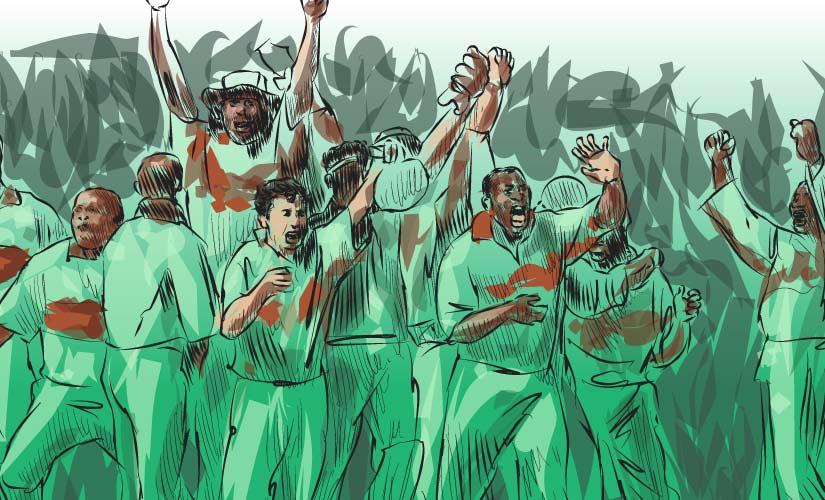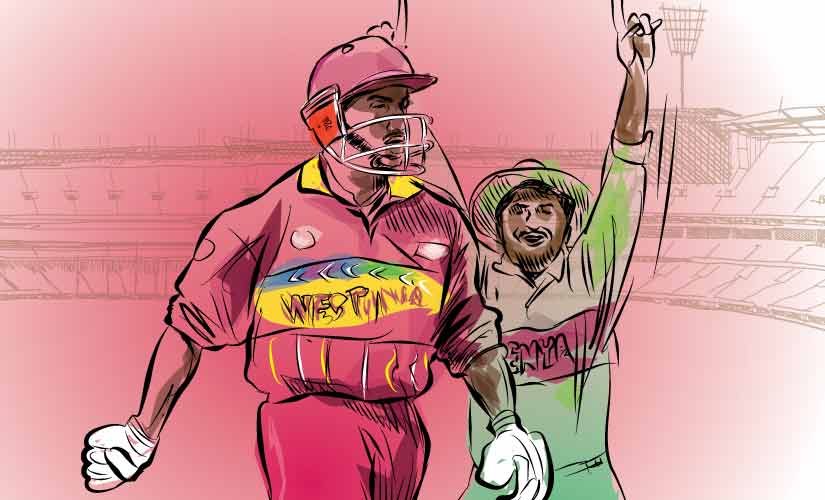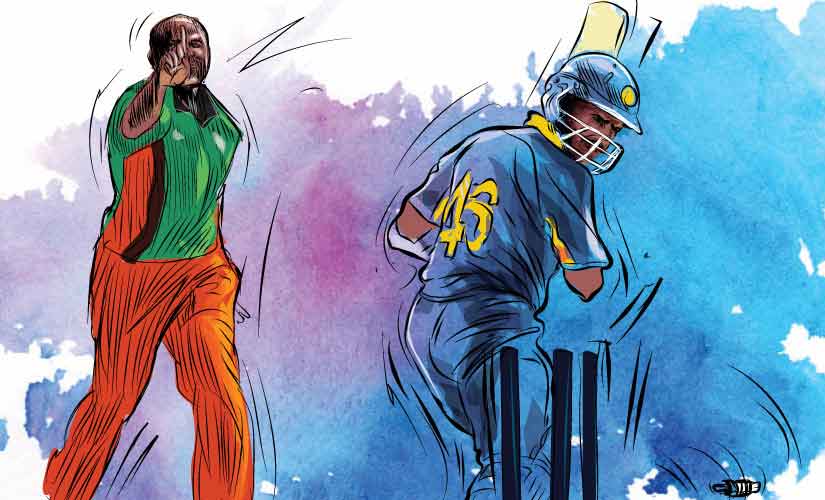“Sometimes it is the people no one imagines anything of, who do the things that no one can imagine.” - Alan Turing There is a certain joy in witnessing an underdog story. The cricketing world and fans at the Nehru Stadium in Pune witnessed one 23 years ago on 29 February, 1996, a day etched in Kenyan cricket’s folklore. Like the Randy Orton RKO out of nowhere, Kenya KOed the West Indies to stun and delight in equal measure. They erupted in a jig every time a wicket fell, danced, took a lap of honour, clicked pictures with the West Indies players on a day that sent Kenyan fans and the nation into a frenzy. [caption id=“attachment_6807791” align=“alignnone” width=“825”]  Kenya celebrate stunning win over West Indies in 1996 World Cup. Artwork by Rajan Gaikwad[/caption] “Nobody on the earth would have expected this kind of a result. This victory is as good as winning the World Cup for them,” the excited commentator raved on air. Yes, it was huge for Kenyan cricket. This was the first time they were participating in a mega event like the World Cup and four matches down the line, they had done the unthinkable. It was a spark that ignited Kenyan cricket. “The win against West Indies is what started things for us,” former Kenya all-rounder Thomas Odoyo, who was a part of that historic win, tells Firstpost. “Obviously, after that we’ve had a lot of success. We played in 2003 where we actually did well. The confidence started in 1996, the team that played in that edition, we more or less stuck together for a while, a few of us. There were guys who actually retired but the majority of us actually stuck around up to 2003. So that to me was the beginning of a long and a good run for Kenyan cricket. We started in 1996 and in 2003 it culminated into reaching the World Cup semis.” Kenya were making their debut in the World Cup and the enormity of the occasion had the team’s adrenaline running high. “The message that was spread across for us was that World Cup is the only time you actually have to showcase all the talent you have,” Odoyo recalls. “So we always believed that this is the time for you to show yourself to the world. If you look at the smaller countries, most of us don’t get the opportunity to be on television so WC is an opportunity for you to be there and showcase the kind of talent you have.” This was their time to stand up and get noticed. The time to grab the limelight which would culminate into bigger things going further. The atmosphere inside the camp was buzzing. “1996 was the first time for us so obviously there was a lot of talk and a lot of promises were made about how if we do well we will get opportunities, contracts, work, the atmosphere was bubbling. I was still a young man at that time so I didn’t really look much into it. I was making my debut at 17 so the World Cup was big, yes, but for me, it was just a matter of being happy just being there.” Kenya didn’t have the best of starts to the tournament. They had lost to India, Australia, and Zimbabwe in their first three matches. But there was no panic heading into the West Indies match. It was, in a way, a special match for a star-struck Kenyan team. “West Indies was obviously a force then,” the former Kenya all-rounder explains. “A big force actually. They were one of the biggest teams in that era. Most of them were our idols. So just being in the same field with them was something else. For most of us, we were looking at getting autographs and all that. So playing against them was something special. We didn’t expect to beat them but when that happened, obviously, we made history.” Richie Richardson put Kenya into bat after winning the toss and bundled them out for 166. Kenya were undone by poor shot selection. At one point they were reeling at 81/6 and there were doubts whether they would cross even the three-figure mark. However, Odoyo, all of 17, the youngest player in the tournament, walked out to the middle to join Hitesh Modi and added a crucial 44 runs for the seventh wicket to bring some stability. And with the help of extras, 37 of them, Kenya dragged themselves to an under par 166. The Kenyan camp didn’t think they could defend 166. However, confidence slowly started to creep in, one wicket after another. “No, we didn’t think we could defend 166,” Odoyo recalls. “Playing against the West Indies against the likes of players that they had, it’s more or less going out there and trying your best. But with cricket, once you smell blood, then you start believing that you can actually do it. We just went in there and tried to show the world what we have. And once we actually got a few wickets, we started believing that we could win it.” Pacers Martin Suji and Rajab Ali provided the perfect start sending back openers Richardson and Sherwin Campbell in the first five overs. [caption id=“attachment_6807841” align=“alignnone” width=“825”]  Kenya celebrate Brian Lara’s wicket in 1996 World Cup. Artwork by Rajan Gaikwad[/caption] But two overs later, Ali injected real belief. He had an erratic Brian Lara caught behind. Maurice Odumbe’s accurate off-spinners choked the scoring in the middle overs to form a stranglehold from which West Indies never recovered. The adrenaline spike was palpable as the fielders threw themselves around to effect two run outs. Odumbe frustrated the men from the Caribbean and scalped three wickets as West Indies succumbed to a 73-run heavy defeat. Odoyo has hazy memories of all that transpired on that special day. “To be honest, I don’t remember that match because I was making my debut and still a youngster in the team. So I was pretty much following what was happening more or less from my seniors. But from what I remember, most of us were pretty thrilled just to be in the WC because it was our first WC, so we had been promised a lot and most of us just wanted to show the world what Kenyan cricket is all about. Some of us were expecting that after the World Cup we will get contracts and all that. That was the selling point from our board. I remember after the game, once the word went round (about our win), the attention we received was just amazing. But to me, I didn’t take it that much because I was still a very young man so just being in the team in the World Cup in the first place, actually, I was the youngest player in the World Cup, so just being in that team in itself was just special.” As soon as Ali made Cameron Cuffy drag one on, the whole of Kenya erupted and the celebrations never stopped. “The celebrations were great, we got a lot of calls from everyone just congratulating us. The West Indians, actually all of them were very nice. They were happy for us. Obviously disappointed that we beat them but they were happy that we were an upcoming nation. They were decent.” Seven years later, Kenya would go several steps ahead and make it to the semi-finals of the 2003 World Cup. They did have some luck going their way with New Zealand forfeiting their match against them owing to safety concerns but en route. they had beaten Sri Lanka, Zimbabwe and Bangladesh. Odoyo stresses that the run in 2003 World Cup was a combination of good fortune and grind. “Reaching the 2003 World Cup semis was a combination of luck, yes, but also hard work,” Odoyo explains. “They say you actually make your luck. You work hard and make your luck. We played some pretty decent cricket. If you remember, by 2003, most of us had stayed together for over 10 years. So we pretty much understood each other’s game. We were a compact side but New Zealand pulling out actually helped our cause. So I remember we beat Sri Lanka at home and Zimbabwe, both were Test-playing countries and those were not really luck, those were actually our performances. We played some decent cricket.” Sri Lanka were the next victims of the giant killers. After being put into bat, Kenya managed just 210/9. However, inspired by the leg spin of Collins Obuya (5/24), Kenya bundled out the Islanders for 157. Being at home in Nairobi was a big motivator. “The win was pretty big and was special, Odoyo says. “We understood our home conditions. In the afternoon, actually, the wicket played differently, spun and stuck on the wicket a bit more, so we understood it wasn’t going to be difficult. The 210 we got wasn’t probably enough but after we got the top guns of Sri Lanka, and with the fans behind you, it made it even easier.” They went on to beat Bangladesh in the next match and then went on to qualify for the Super Six, from Pool B, finishing second with 12 points along with table-toppers Sri Lanka. And just one win from three matches in the Super Six, against Zimbabwe, catapulted them into the semis. The atmosphere, as expected, was special. “Qualifying for the semis was a big achievement for all of us,” Odoyo recalls. “It’s not every day you find a country like Kenya in semi-finals. And being there when no one really expected you to be there when you had all the big guns out. So it was a pretty special atmosphere to be in.” However, in the semis, they bumped into a rampant Indian side for the second time in the tournament. Electing to bat in Newlands, Cape Town, India posted a competitive 270/4 built on the back of another century from Sourav Ganguly (he had hit a ton earlier in the tournament against Kenya) and Sachin Tendulkar’s 83. In reply, Kenya got off to worst possible start at 63/5, and only Steve Tikolo showed some fight as the Kenyans folded for 179. Heading into the match, the atmosphere in the camp was relaxed rather than anxious. “By the time we reached the semis, most of us had really exceeded our expectations. So playing against India was a pretty much relaxed atmosphere. What we had already achieved was beyond our dreams. India had the big guns, you were playing against the likes of Sehwag, Tendulkar, Ganguly. We were confident but we were also just happy to be there. They beating us was pretty much what was expected. We just went out there and expressed ourselves.” The disappointment was overridden by a sense of satisfaction and pride post the loss. Those 39 days had provided memories that would last a lifetime. “We were satisfied with what we had achieved. By the time we were in the semis, most of us were happy that we were there. So we were proud of what we had achieved. And we will cherish those moments forever. You pretty much don’t get to be in the semis every time. Those are the memories that we will remember until we die.” Odoyo had played his part in the dream run finishing as joint-highest wicket-taker for Kenya at an impressive average of 24.33 and economy rate of 4.05. And to think he was only half fit. “The key to success was the confidence that I had gained. I was pretty much an experienced player by then. But by then I was really struggling with the injuries. I had hamstring injury and all that stuff. I was playing but under a lot of pain killers for the hamstring injury I was carrying. Personally, I wasn’t really at 100 percent but I still achieved what I did. So it was pretty trying to be there in that atmosphere and not to actually give up.” However, Kenya never reached such heights after that and went on a downward spiral. They lost eight of their next 9 World Cup matches. Odoyo believes that not having the right people at the helm along with infighting has hit the team hard. “What went wrong in Kenyan cricket is what is actually going on until now,” he explains. “We’ve never really bothered to bring in the right people at the helm plus the structures that we have. We need to sort out our structures. If we don’t have the right structures, it is very difficult to get the quality of players coming through. If we are still depending on club cricket for us to get players to play international cricket, then it will never happen. We need to get the right structure where there are different levels of competition up to the highest level. We need to get ourselves at least a high-performance centre. And get our former players back to help out. Maybe they are not coaching at the international level, maybe you need somebody else but at a lower level, while you bring them up, you need your former players to be involved. And unfortunately, that’s not happening too much at the moment. So we are struggling and the problem is that we are sinking at a very fast rate. Our officials are also busy fighting instead of actually helping the game grow.” Odoyo is an integral part of Kenyan cricket history. He was a part of five World Cups, since 1996, and still cares about Kenyan cricket. “Five World Cups is an achievement on its own. I am very proud of what I have achieved. I am very happy that I was part of the Kenyan cricket for a very long time. I gave back to the game for over six years. It’s not that I can’t give back again. I was a coach and all that. I’ve done that part and will continue doing it in my own way. Because now I am not a full-time person in cricket but I still follow the game very much and still care deeply about what happens in Kenyan cricket.” [caption id=“attachment_6808091” align=“alignnone” width=“825”]  Thomas Odoyo celebrates the wicket of Marvan Atapattu in 2003 World Cup. Artwork by Rajan Gaikwad[/caption] Ask Odoyo about his favourite wicket and he vividly remembers that in-dipper that cleaned up Marvan Atapattu in the 2003 World Cup match in Nairobi. “Marvan Atapattu in Nairobi. Bowled. The ball beating the bat and clipping the middle stump. That was a pretty decent ball, I enjoyed that wicket the most.” So what is the one World Cup memory that will stay with him forever? “That 2003 World Cup semi-final. Being in that semi-final itself. The atmosphere just before the match, the training session, everything. Just being there. That is the memory that will always be there. We can’t forget that. Personally, I can’t forget that,” he signs off. For all the latest news, opinions and analysis from ICC Cricket World Cup 2019, click here
The cricketing world witnessed an underdog story 23 years ago on 29 February 1996, the day on which Kenya beat West Indies in 1996 World Cup. Thomas Odoyo recalls that famous win by the star-struck Kenyans.
Advertisement
End of Article


)

)
)
)
)
)
)
)
)



